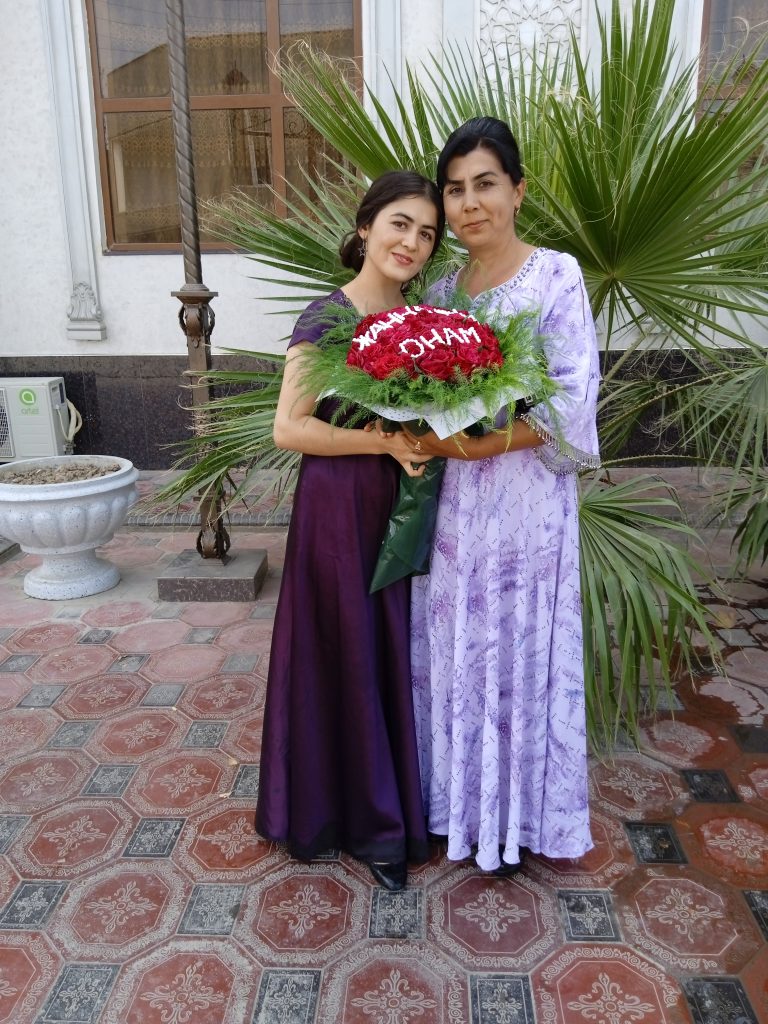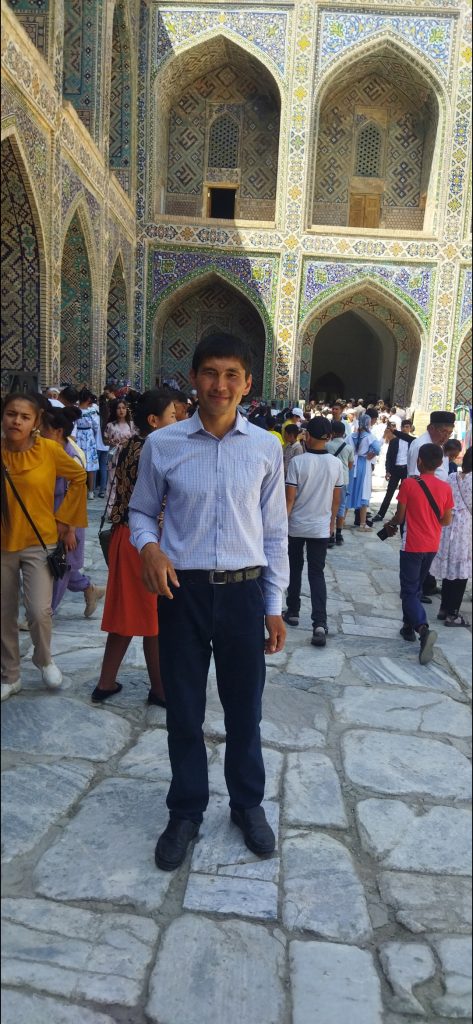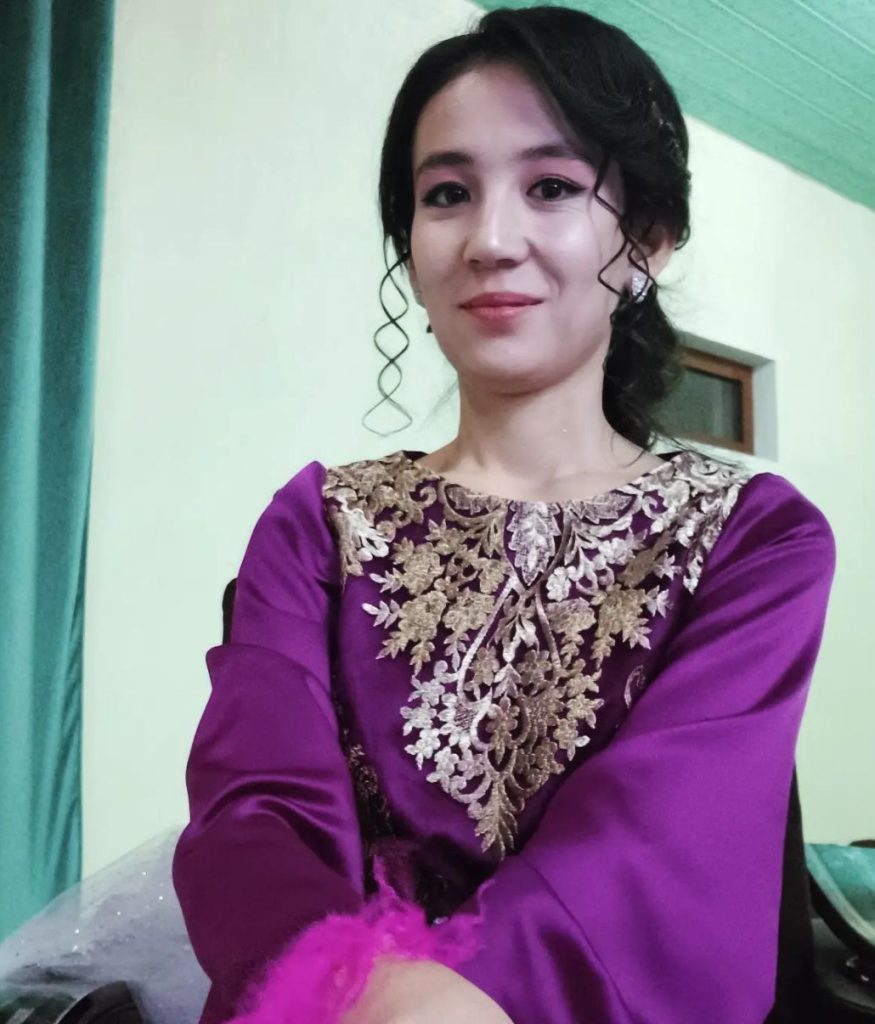
Heaven is under mother’s feet
The love left in the mother’s heart,
Today, budding love.
We look at life with wide eyes,
Our hearts are full of spring flowers. (Nozima Ulugova)
A day before the birth of the baby from God asked:
Why am I coming to this world? What am I? Should I do
The God replied:
- I will give you an angel. He is always with you will explain everything.
- Where can I find him, after all, its language I don’t know?
– The angel will teach you the language and protect you from various calamities.
What is the name of my angel?
Its name is not important. You call her “Mom”.
you name it!
Do you know who the mother is?
The dark nights are for you when you are helpless
radiating light, leading you to bright days
outgoing breed.
Do you know who the mother is?
Even if she is about to die of hunger
She is the one who can give you the last bite, the destiny.
if it’s like a thorn in your heel, it’s her who who feels pain as if spears are being stabbed in her heart
Do you know who the mother is?
How many pains to bring you into the world,
even death is under her feet
the great lord of heaven!
Do you love your mother when we were children, or rather, when we started to recognize our memories?
do you love your dad – they asked
and, of course, many answer that it is my mother.
It doesn’t mean I hate my father at all.
on the contrary, it is your love for your mother
a high symbol, priceless sincerity to the mother
Our fathers also understand that it is an expression. To them
to love and honor our mothers,
our respect never sinks. Because
our fathers also have mothers. They still are
they call their mothers lonely. Uzbek children, Uzbek
Mother has always been unable to speak the language of her people
is a symbol of inexhaustible love in the heart! honoring the mother,
like a crown on our head instead of its dignity
lifting is our heritage from our ancestors. as a great person said: “If you ask who is the greatest in this world, I will always say my mother without a doubt.”
Mother is amazing in herself as well as being great
rich in mysteries embodying miracles
is a human being. For example: the baby is screaming and crying. Him
calm down no matter how hard the people around you try
they don’t get it. The child does not agree to deception or deception.
His mother, freed from her chores, immediately took him in her arms
press A baby calms down when it smells its mother.
Another case: the child is sick, has a high temperature, one
is lying in a state. The doctor’s medicine for him
is not too blind. then the mother lovingly touches the forehead of her crying child
He puts his warm palm. After a while, the child calmed down
starts to get Such a miracle worker related to mother
many examples can be given.
When a person is happy, when from diseases
when he is healed, when his sweet soul rests. And the mother
He feels happiness when his children are happy.
The mother is so kind and generous that with great invisible power and love only
not children, loved ones, but the whole head
take humanity into your bosom and be a cure for its pain
takes Mother’s happiness is children’s happiness, family happiness is society
is happiness. Mother this priceless happiness to no one, no
what can’t they do?
Mothers often lie. Witness
I have:
“Baby, you eat, I’m full.”
“Eat this meat, I’ll eat that
I don’t like it.”
“Take this money, I don’t need it.”
“Close this sheet, I’m not eating.”
“Don’t cry, I’m not sick. On the contrary, I am
If I sneeze quietly, immediately take it out to the patient
they try to preserve.”
When I was a child, I suffered a lot from toothache
I would Before falling asleep, I would ask my mother to tell me a story. My mother is also a mija with me
they came out without hesitation. They started their stories while pressing their palms on my face. Early morning my eyes
I didn’t feel any pain when I opened it. Har
Sometimes when I was sick, my medicine was my mother.
I went to the market in winter in shoes and gave me boots as a gift
My mother, the world, household worries
when you’re down and teary-eyed,
“It seems that dust has entered my eyes, my daughter.”
my lying mother, today is your little girl
grew up. don’t worry mom, yours
your child is a strong person. You now to no one
does not hurt.
I found love in this world,
You are my happiness, I am lucky without you.
My paradise found in the worlds,
There are no tears in your eyes, mother!
A human child sees this bright world because of his mother
will be lucky and prosperous. Because of mother
he will enjoy all the pleasures of this life.
Thanks to the mother, to the pleasures and joys of the world
is buried. He will get happiness because of his mother. He dedicated his life to goodness, virtues, and selfless deeds
mobilizes and good deeds during his life
will be surrounded. Same with me
I will never give you my pain, advice, or advice
My loving prayers are always with me.
I feel comfortable and happy with them.
When I dream of heaven, my dreams come true
the dream is alien to me, happiness is in my way.
It is a house full of light, a house with mothers,
I am happy, you are with me, my heavenly mother.
Every child, be it a boy or a girl
first of all, he should try to please his mother.
We are upset with our mothers when we raise our voices
it is impossible for us to be.
Think brother, God is under the feet of mothers
didn’t he leave heaven? Praise them with love
didn’t you urinate, a light in our head in dark nights
didn’t he do it? If we sing, we will be happy
didn’t it burn? Instead, what did he ask us?
Just love. Who are we to be unkind to him?
we do An orphan to know the value of parents
It is not necessary to be born.
Mankind appeared on earth
glorifying the image of the holy mother, the venerable woman,
always comes with honor. In honor of our mothers,
The soil of our homeland is beautiful like the gardens of paradise
is priceless. Our country is peaceful and our sky is peaceful because of the prayers of mothers
pure, fruitful in our work, blessed in our life.
Let’s protect our paradises near us, dear ones
Owner of the “Islam Karimov” State Scholarship.
Nozima Ulug’ova was born on October 13, 2001 in “Yosh gayrat” neighborhood, Shorchi district, Surkhandarya province. He graduated from the 37th general education school in the Shorchi district and at the same time, the Nukus branch of the State Institute of Arts and Culture of Uzbekistan “Art Studies” 3rd-level student of the department “Dramaturgy of Stage and Screen Art”. In 2022, his creative author collections “Mother for you” and “Salvation” were published and gained their readers. At the same time, his creative story is among the young artists of Uzbekistan. “Culture”, “Creative Flight”, “Women and Time”, “Surkhan Youth”, “Morning Star” are examples of creativity in our republic. It is covered in newspapers, “Gulkhan” magazine and “Nurli Jol” newspaper of Kazakhstan. The young penman did not limit himself to creativity, but participated in conferences and scientific meetings in prestigious journals with a factor recognized by OAC with about 20 scientific articles, pamphlets and theses.”Samarkand Youth Forum 2021″ “Uzbekistan Development Forum 2021” Participant of several forums and conferences, festivals and seminars. Nozima Ulug’ova in Personal development & Step into the international sphere Course, because he was able to show his activity and interests in the fields of literature and art in this course .Creativity Forum for Culture, Arts and Peace International member, Active member, working Group of International writers “Jontous por las Letras” Iqra Foundation has received membership offers from several international organizations in its field.


